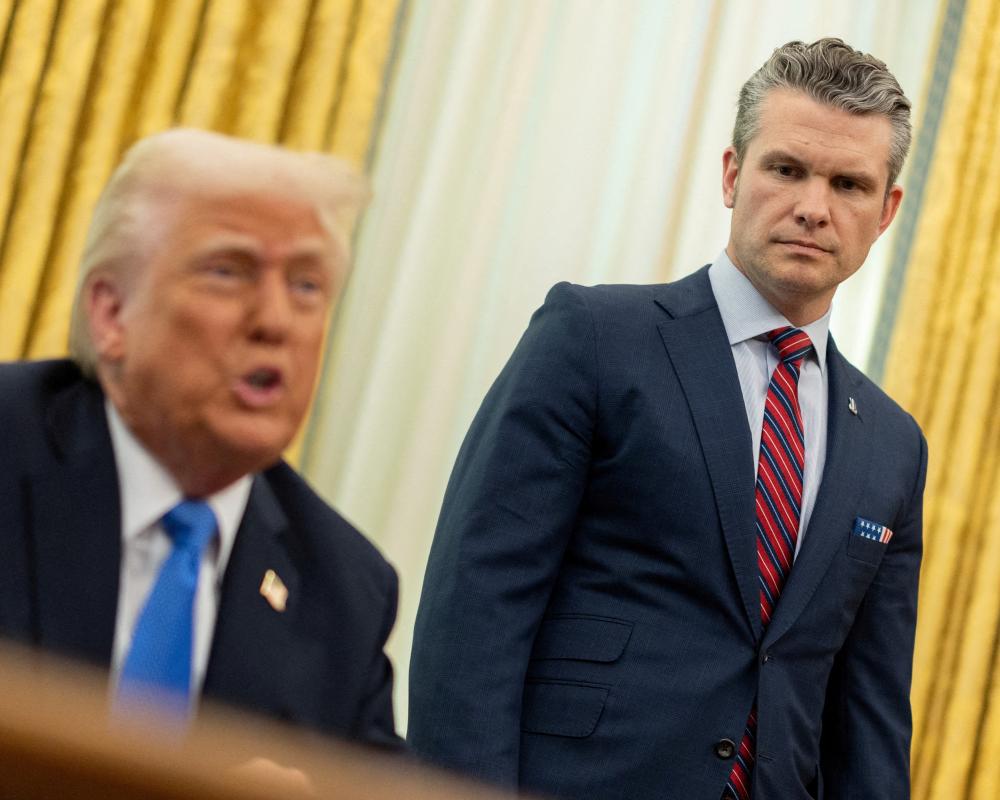The White House has lost confidence in a Pentagon leak investigation that Pete Hegseth used to justify firing three top aides last month, after advisers were told that the aides had supposedly been outed by an illegal warrantless National Security Agency (NSA) wiretap.
The extraordinary explanation alarmed the advisers, who also raised it with people close to JD Vance, because such a wiretap would almost certainly be unconstitutional and an even bigger scandal than a number of leaks.
But the advisers found the claim to be untrue and complained that they were being fed dubious information by Hegseth’s personal lawyer, Tim Parlatore, who had been tasked with overseeing the investigation.
The episode, as recounted by four people familiar with the matter, marked the most extraordinary twist in the investigation examining the leak of an allegedly top secret document that outlined options for the US military to reclaim the Panama canal to a reporter.
Related: White House to take choice of Pentagon chief of staff out of Hegseth’s hands
The advisers were stunned again when Parlatore denied having told anyone about an illegal NSA wiretap himself and maintained that any information he had was passed on to him by others at the Pentagon.
The leak was first attributed internally to Hegseth’s senior adviser, Dan Caldwell, who was escorted out of the Pentagon and fired last month alongside two other aides, Hegseth’s former deputy chief of staff, Darin Selnick, and the deputy defense secretary’s chief of staff Colin Carroll.
But the illegal wiretap claim and Caldwell’s denials fueled a breakdown in trust between the Pentagon and the White House, where the Trump advisers tracking the investigation have privately suggested they no longer have any idea about who or what to believe.
In particular, one Trump adviser recently told Hegseth that he did not think Caldwell – or any of the fired aides – had leaked anything, and that he suspected the investigation had been used to get rid of aides involved in the infighting with his first chief of staff, Joe Kasper.
The fraught situation is sure to increase pressure on Hegseth ahead of a Senate hearing next month, and more broadly for his office, which has been roiled by the leak investigation that has now continued for nearly a month with no new evidence or referral to the FBI.
The fallout has left Hegseth with no chief or deputy chief of staff, as he relies on six senior advisers to run his front office, which is involved in setting the direction of the defense department that has a budget of nearly $1tn and oversees more than two million troops.
And while Hegseth’s former junior military aide Ricky Buria has effectively assumed the job of the chief of staff, the White House has blocked Hegseth from giving him the job permanently on account of his limited experience and role in internal office drama.
The Pentagon declined to comment on reporting for this story. A spokesperson for the White House said in a statement: “President Trump is confident in the secretary’s ability to ensure top leadership at the Department of Defense shares their focus on restoring a military that is focused on readiness, lethality, and excellence.”
White House spurred by rumors
The skepticism among the Trump advisers is widely seen as a product of several developments that started shortly after the suspensions of Caldwell and Selnick on 15 April, followed by the suspension of Carroll on 16 April, according to seven people familiar with the matter.
After the aides were fired on 18 April and issued a joint statement denying wrongdoing, the White House received its first briefing on the firings.
At that juncture, a handful of Trump advisers in the West Wing and elsewhere were told there was evidence that Caldwell had printed a document on US military plans for the Panama canal classified at the top secret level, took a photo, and sent it to an reporter using his personal phone.
But the advisers grew uneasy in the ensuing weeks after Caldwell appeared on former Fox News host Tucker Carlson’s podcast, denouncing their firings as the product of internal office politics at the Pentagon and alleging that the investigation had become weaponized against them.
They also then learned of a rumor at the Pentagon that Air Force office of special investigations (OSI), which had been working the case for weeks beforehand, had possibly identified the leaked Panama canal document by virtue of the fact that it was a draft that lacked certain details that were in the final version of the document.
As the rumor went, the document had led Air Force OSI to focus its investigation on mid-level aides who worked in the US Southern or Central Command or for the joint chiefs of staff, and had not been told to focus on the activities of the three aides until the weekend after they had been fired.
It was not immediately clear whether the the rumor was correct or even from where it emerged. But it appears to have spurred the White House to press Parlatore to disclose the evidence against Caldwell, including how the Pentagon knew what was on his phone.
At first, Parlatore rebuffed the attempts to obtain the underlying evidence, noting it was inappropriate for the executive branch to insert itself into an ongoing criminal investigation that he said could still yield charges.
But towards the end of April, according to what the Trump advisers shared inside the White House, Parlatore suggested that there had been a warrantless wiretap on Caldwell’s phone.
Parlatore has denied making such a claim when confronted by associates, and has generally maintained during the investigation that he has only passed along information briefed to him by others. Reached by phone on Monday, Parlatore referred questions to the Pentagon press office.
Still, the Trump advisers who reeled from the claim also eventually told Hegseth they were concerned by the optics of Parlatore, who had been close to the former chief of staff Kasper, running an investigation that targeted Kasper’s perceived enemies in the office.
The warrantless wiretap episode was not formally resolved. The investigation was transferred to deputy defense secretary Stephen Feinberg’s office around the time that Parlatore had planned to step away to prepare for the trial of another client, Adm Robert Burke, on federal bribery charges.
Parlatore remains a close confidant of Hegseth and he retained his ability to make recommendations in the investigation, according to two people familiar with the situation. Commissioned by Hegseth as a commander in the navy reserve, he is subject to the uniform code of military justice and cannot be directly fired.
The post White House stunned as Hegseth inquiry brings up illegal wiretap claims appeared first on The Guardian.




